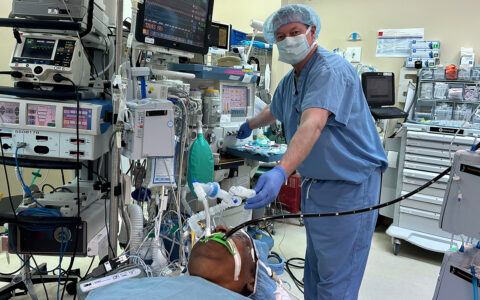Vanderbilt University Medical Center is participating in a national study aimed at answering some hard questions about kidney transplantation in the African American community, with the goal of improving patient outcomes.
Black Americans are nearly four times more likely than white Americans to develop kidney failure requiring dialysis. Up to 70 percent of this excess risk is attributed to high-risk variants of the apolipoprotein-1 (APOL1) gene, which are found only in people of recent African ancestry.
“This could lead to fewer discarded APOL1 low-risk genotype kidneys and increase the supply available for transplant.”
The primary objective of APOLLO is determining whether the presence of APOL1 renal-risk genotypes in deceased-donors is associated with death-censored renal allograft survival. “We’re going to confirm that, one way or another,” said Kelly Birdwell, M.D., an associate professor in the Division of Nephrology and principal investigator leading Vanderbilt’s participation in the study.
Clarifying the Genetic Role
The observational study by the APOL1 Long-term Kidney Transplantation Outcomes (APOLLO) Network will conduct genetic testing and evaluate outcomes from 2,614 deceased kidney donor-recipient pairs, as well as additional living-kidney donor-recipient pairs and unpaired deceased-donor kidneys.
The study, funded by the NIDDK, is now in its fourth year of recruitment. Vanderbilt and 12 other APOLLO Network centers are working with the nation’s transplant centers, organ procurement organizations and the United Network for Organ Sharing to enroll donors and follow transplant outcomes.
“To make [the Community Advisory Council] a formal part of how the NIH is conducting this research … it’s setting an example for how this could be done in future clinical research grants.”
Explaining the role these genetic variants play in the success or failure of kidney transplants could prompt a revision of the current formula for calculating the kidney donor risk index by replacing the ethnicity/race component with APOL1 genotype. “This could lead to fewer discarded APOL1 low-risk genotype kidneys and increase the supply available for transplant,” Birdwell said, leading to improved quality of life for recipients and reduced health care costs.
Currently just over 90,000 people nationwide are on the kidney transplant waiting list.
Community Involvement Key to Recruitment
An essential feature of the study is the involvement of the APOLLO Community Advisory Council, comprised of Black kidney transplant recipients, donors and family members who provide input into research protocols and how best to inform donors and their families about the importance of participating in the study.
The council advised researchers to obtain consent from living donors and families of deceased donors before their kidneys are included in the study. Yet because of long-standing distrust of medical research in the African American community, about 20 percent of donor families do not give consent, Birdwell said. “Part of this study is just to try to increase the conversation,” she added.
Glenda Roberts, a Black kidney transplant recipient from Seattle, serves on the APOLLO Community Advisory Council. She also was a member of the National Kidney Foundation and American Society of Nephrology task force that recommended removing an artificial, race-based calculation in diagnosing kidney disease.
“It’s so important to have a conversation with the community, so that you help to build trust and encourage more people to participate in research,” said Roberts, director of External Relations and Patient Engagement at the University of Washington Center for Dialysis Innovation and Kidney Research Institute.
“This is one of the first large-scale NIH studies involving people in the community who are affected by the research and who are providing advice to the scientific community,” she said.
Birdwell agreed. “To make [the Community Advisory Council] a formal part of how the NIH is conducting this research … it’s setting an example for how this could be done in future clinical research grants like this,” she said.





